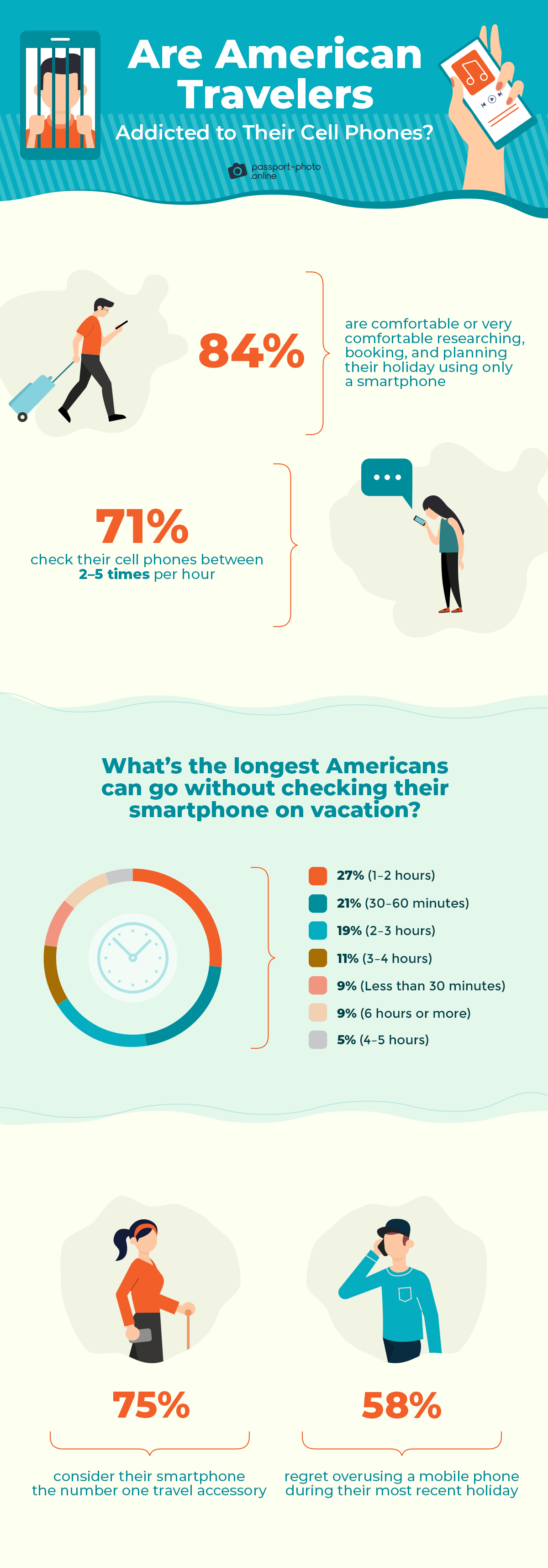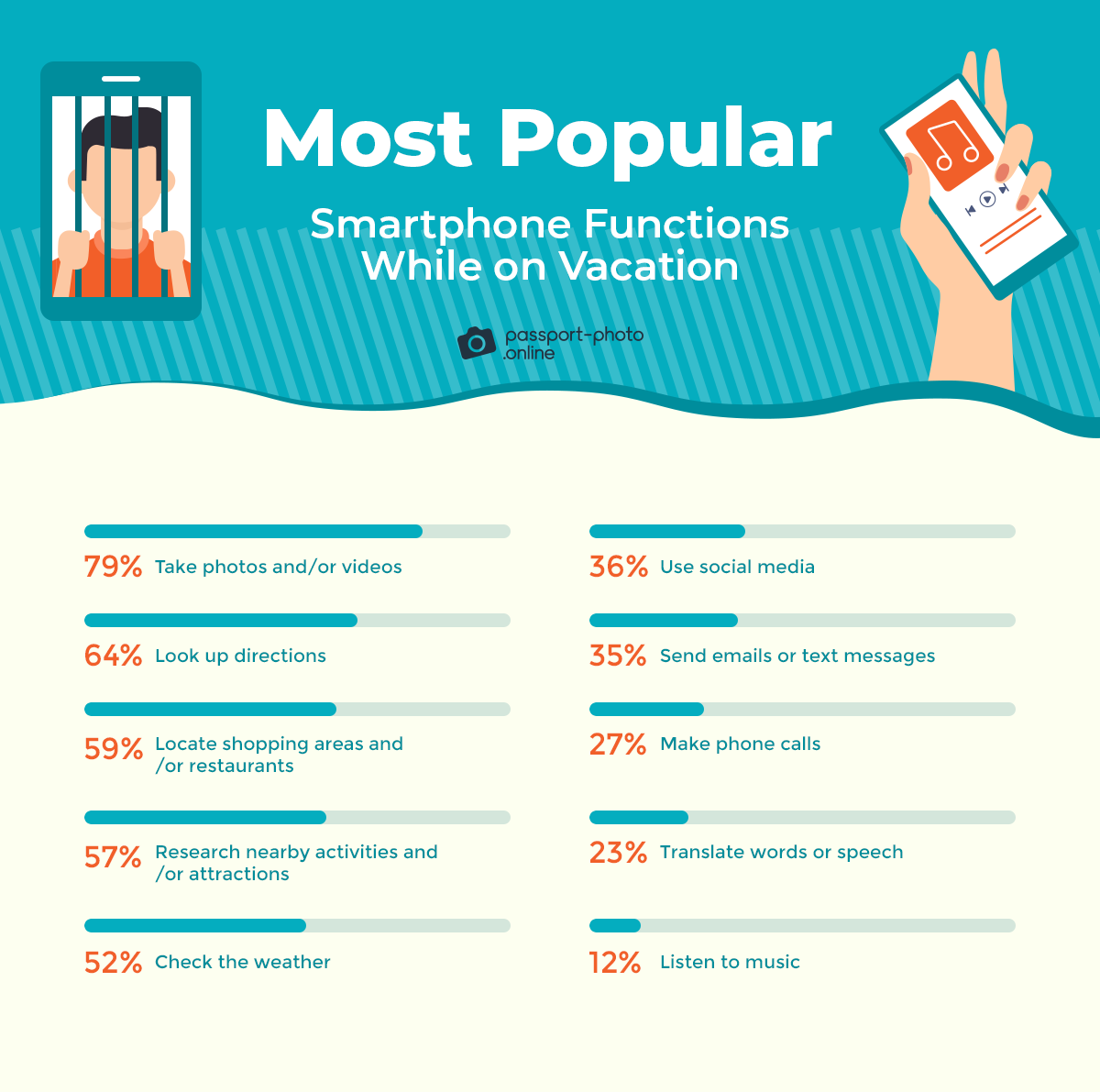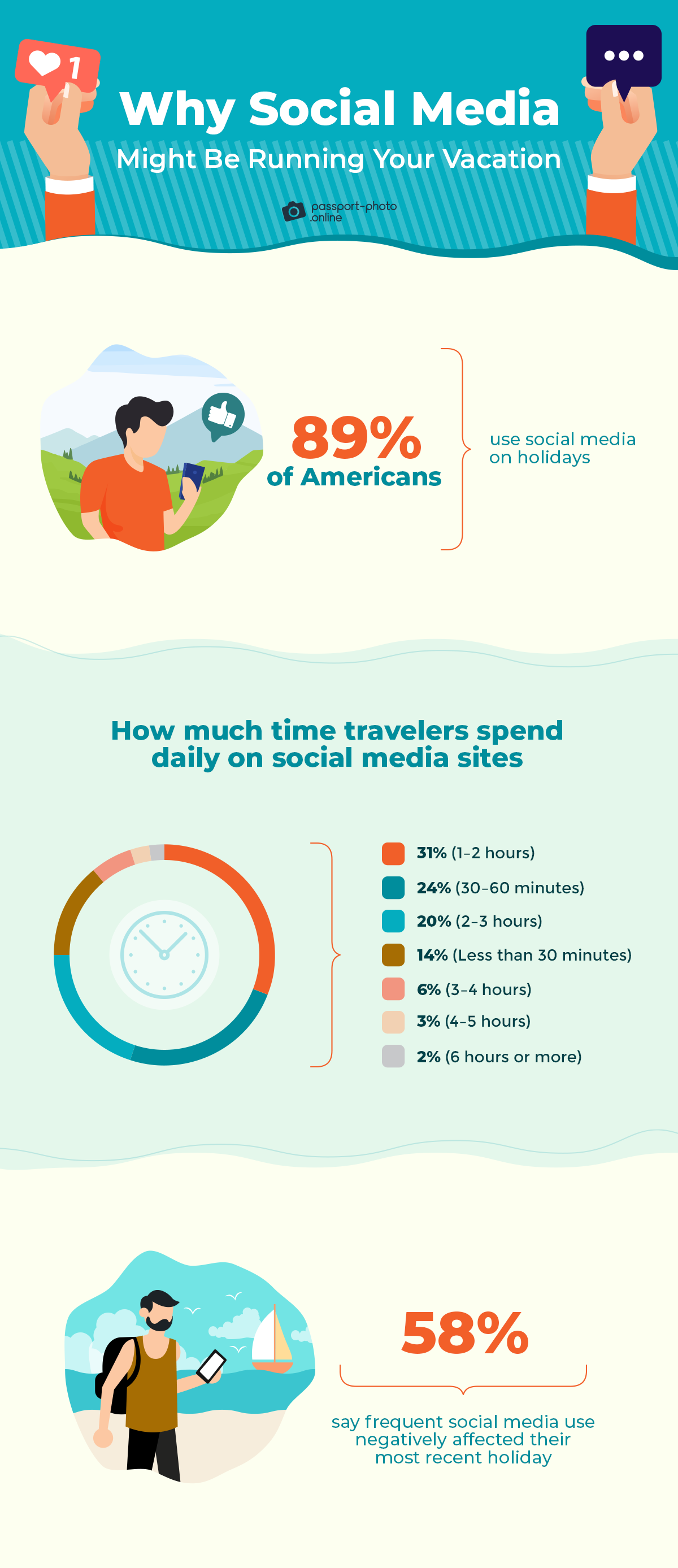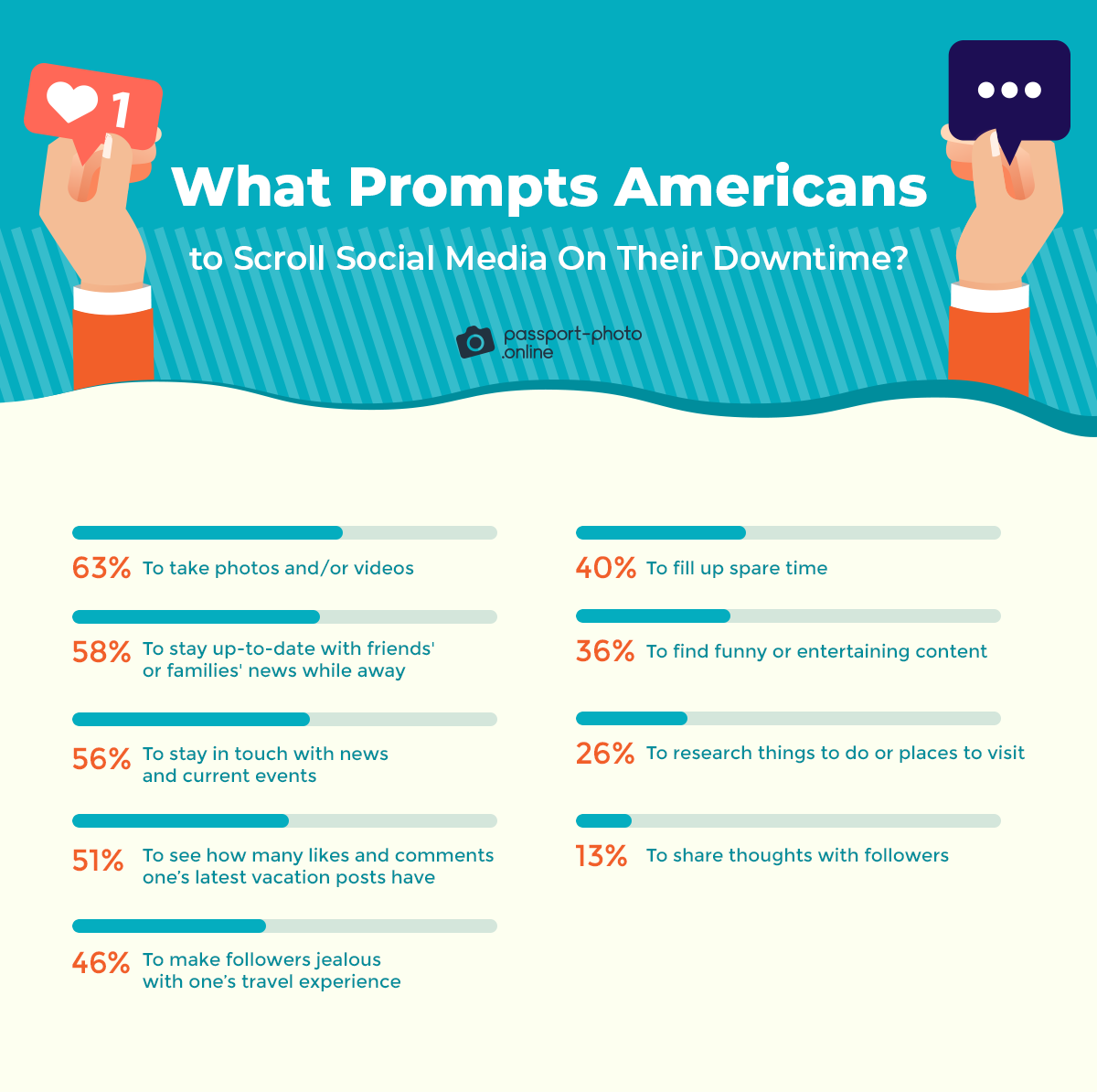Picture this:
You’re sipping a refreshing Cuba Libre by the pool. A moment later, you get an email from one of your colleagues.
Reluctantly, you reach for your phone and soon find yourself in an endless vortex of notifications, messages, and Instagram Reels. By the time you put it down, the ice cubes have melted.
Does it sound familiar?
If so, you aren’t alone. While smartphones are infinitely useful devices, they can also hijack your holiday and make it difficult to unwind.
So—
At Passport Photo Online, we’ve decided to poll 1,000+ Americans on their smartphone use during travel, discover whether they used it for work, social media, and much more.
Are American Travelers Addicted to Their Cell Phones?

To begin with, we wanted to ask the respondents how comfortable they are researching, booking, and planning a vacation using only a smartphone.
It turns out 84% of Americans are comfortable or very comfortable with it—a 36% increase compared to 2018. Perhaps, it shows the travel industry has further embraced the mobile-first approach, making it easier for travelers to arrange the entire trip on the go.
Next, we asked Americans if they used smartphones during their most recent vacation. A full 97% said “Yes.” Moreover, that percentage remains high across all the major demographics:
- Gen Zers (25 or younger): 99%
- Millennials (26–38): 97%
- Gen Xers (39–54): 98%
- Baby Boomers (55 or older): 93%
How do we use our devices?

Now—
When we asked how often American vacationers pull out cell phones, we found that most (71%) do it between 2–5 times per hour. And if we assume we’re awake an average of 16 hours, it’s safe to say most travelers check their smartphones ~32–80 times per day.
It’s also noteworthy that 10% admitted they take a peek 10+ times per hour, which translates into over 160 times daily!
Quite a lot, huh? So, it’s no surprise 58% of the respondents regret overusing mobile phones during their most recent holiday.
Diving deeper into the survey results, we discovered what’s the longest Americans can go without checking mobile phones while on vacation:
- 1–2 hours: 27%
- 30–60 minutes: 21%
- 2–3 hours: 19%
- 3–4 hours: 11%
- Less than 30 minutes: 9%
- 6 hours or more: 9%
- 4–5 hours: 5%
Lastly, we asked the survey takers to what extent they agree or disagree with the following statement: My smartphone is my number one travel accessory. A whopping 75% of American travelers agreed or strongly agreed with it.
So—
Most of us can’t seem to catch a break from mobile devices, even while indulging in R&R. A silver lining, however, is that over half have realized they spend too much time glued to smartphones and will hopefully cut down on technology next time.
Why Social Media Might Be Running Your Vacation

There’s no question about it:
Social media has a stark influence on society and younger generations in particular. So much so that 40% of Millennials choose holiday destinations based on how Instagrammable the pics will be, according to Schofields’ recent study.
That’s why we asked US vacationers if they used smartphones to check social media during their most recent holiday. A full 89% said “Yes.”
As a follow-up, we asked how much they feel they averaged on social media sites per day when traveling. Below are the results:
- 1–2 hours: 31%
- 30–60 minutes: 24%
- 2–3 hours: 20%
- Less than 30 minutes: 14%
- 3–4 hours: 6%
- 4–5 hours: 3%
- 6 hours or more: 2%
So, most American travelers (55%) spend between 30–120 minutes daily on social media. Here’s what prompts such frequent use.

Interestingly, nearly half of vacationers (46%) admit they wanted to make followers jealous with their travel experience. That goes hand-in-hand with eHotelie’s research, which also found that 50% of travelers upload photos to social media just to show off.
Finally, we asked the survey participants if they feel frequent social media use negatively affected their most recent holiday. Nearly 58% said “Yes.”

Do you need passport photos? Find out more:
Working on Vacation: It’s Time to Learn How to Switch Off

You might’ve heard about hustle culture.
It’s a catchphrase that refers to the mentality that you must work around the clock in pursuit of your career goals.
And as a nation, we seem to have fully embraced it. For one, most US employees work 45+ hours a week, according to The Washington Center for Equitable Growth. Two, 46% of us also have a side gig in addition to day jobs, based on GOBankingRates’ report.
The result?
We often find ourselves attending to work tasks or emails on weekends or even when sunbathing, unable to unplug from smartphones.
To prove it, we asked the respondents if they used mobile devices for work-related purposes while on their most recent vacation. About seven out of 10 Americans (68%) answered positively. Here’s also a generational breakdown of the responses:
- Gen Zers (25 or younger): 78%
- Millennials (26–38): 71%
- Gen Xers (39–54): 66%
- Baby Boomers (55 or older): 48%
As you can tell, even when employees are on vacation, it doesn’t mean they stop working—and that’s particularly true for Gen Zers and Millennials. Sadly, leading a hustle lifestyle often comes at a price. Namely, we found that:
- Roughly 62% of US travelers agree or strongly agree that using a cell phone for work made them unable to relax and recharge their batteries.
- Six out of 10 Americans say using a smartphone for work-related purposes caused them to change their vacation schedule.
But—
Regular employees aren’t the only ones to blame for working on their downtime. When we asked the respondents if their bosses expect them to stay connected while away, a whopping 60% said “Yes.”
Furthermore, over half of American workers (55%) feel pressure to respond to work emails or messages on vacation, even if the employer doesn’t require it.
So, it wasn’t all that surprising that when we asked the survey takers if they wish they’d been unreachable from work during their most recent holiday, 66% answered positively.
In this context, we’d like to emphasize that it’s not okay to continually bother workers on vacation. Otherwise, you’ll be contributing to the always-on culture where people can’t take a full break from phones, which might ultimately lead to resentment or even burnout.
Stacking It All Up
Here’s the reality:
Most Americans spend more time on their cell phones than in beach chairs. And the two core drivers of smartphone attachment on vacation seem to be social media and work.
Lastly, before we’re over and out, here’s a quick recap of the study’s key findings:

- About 75% of American travelers consider their smartphone the number one travel accessory.
- Most US travelers (71%) check their cell phones an average of 32–80 times per day—10% admitted they take a peek ~160 times daily.
- Over half of vacationers (55%) spend between 30–120 minutes daily on social media, with 46% looking to make followers jealous with their travel experience.
- Nearly seven out of 10 employees (68%) use mobile devices for work on their downtime.
- Yet, 62% of travelers admit that using smartphones for work-related purposes made them unable to relax and recharge their batteries.
- Nearly 60% of US workers say their bosses expect them to stay connected while on vacation.
- Just over half of employees (55%) feel pressure to respond to work emails or messages while away, even if the employer doesn’t require it.
- Around 66% of US employees wish they’d been unreachable from work during their most recent holiday.
Methodology
We conducted an online survey of 1,002 US respondents via a bespoke online polling tool in January 2022. This study was created through multiple steps of research, crowdsourcing, and surveying. All survey participants’ responses were reviewed by data scientists for quality control. The survey had an attention-check question.
Fair Use Statement
Did our findings help you learn more about smartphone usage on vacation? If you believe your audience will be interested in this information, feel free to share it. Just remember to mention the source and link back to this page.
Sources
- Boushey H., Ansel B., “Overworked America”
- eHotelier, “Smartphone Use Impacting Holiday Activities: Study”
- Google, “How Smartphones Influence the Entire Travel Journey in the US and Abroad”
- Huddleston C., “46% Of Americans Need a Side Hustle Just to Cover Basic Expenses”
- Schofields, “Holiday Destination Chosen Based on How ‘Instagrammable’ the Holiday Pics Will Be”

As a Digital PR specialist and a member of the Society of Professional Journalists (SPJ), Max has 5+ years of writing experience.
Over the course of his career, Max’s work has garnered significant attention, with features in numerous prominent publications such as The New York Times, Forbes, Inc., Business Insider, Fast Company, Entrepreneur, BBC, TechRepublic, Glassdoor, and G2.
![Smartphone Use On Vacation [2022 Study]](https://passport-photo.online/blog/wp-content/uploads/2022/02/smartphone_vacation_hero_image_2.png)








